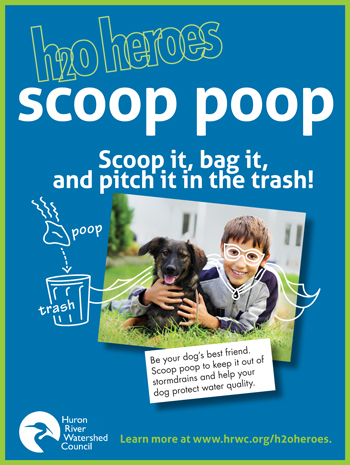Prevent pet waste and harmful bacteria from washing into our waterways.
An estimated 145,000 pet dogs and 119,000 pet cats live in the Huron River watershed. Their waste can contain bacteria and microorganisms that are unsafe for humans. When it rains, pet waste left on the ground can wash directly into neighborhood storm drains and ultimately into waterways—untreated.
Get our pet waste tip sheet
Scoop poop and dispose of it in the trash!
Pet waste contributes to water quality problems. When it ends up in a stream or river, it decomposes, using up oxygen and releasing pollutants into the water.
During summer months when water is warm, the combination of low oxygen levels and ammonia from pet waste can kill fish and other aquatic organisms. Nutrients from pet waste can also cause excessive growth of aquatic weeds and algae, making waterways murky green, smelly and unappealing.
Bacterial contamination from E. coli and other harmful microorganisms in pet waste, especially following rainstorms, remains a human health concern for some waterways in the watershed.
Pet waste is not suitable for use as fertilizer or compost.
YOU CAN MAKE A DIFFERENCE . . .
Make your dog proud.
Scoop poop, bag it and pitch it in the trash every time!
Be prepared. Carry disposable bags.
Carry extra bags to share with your friends.
Buy bag “caddies” and attach them to every one of your leashes.
Keep bags in your coat pockets . . . the car . . . the garage . . . everywhere that makes it more convenient to use them.
Use a mini flashlight to help with nighttime pick-ups.
Work cooperatively. Work with neighbors to install signs, bag dispensers and trash cans in pet-frequented areas in your neighborhood, reminding visitors to clean up.
Spread the word. Educate others about how stormwater can wash untreated pet waste right into our waterways. Think of friendly ways to start a conversation to tell your friends and neighbors how they might change their behavior to help protect our rivers and streams. “Excuse me. Did you drop something?” “Oh, here, I have an extra baggie for you and your dog.” “Did you know…?”
It’s the law. Most communities have local ordinances about pet waste pick up. Avoid fines. Report violators.
What about kitty litter?
Cat waste and kitty litter used by cats that is dumped outside can also wash into storm drains. When cleaning out the litter box use a two-step approach.
1—Scoop the poop and flush it down the toilet.
2—The remaining used kitty litter should be bagged and pitched in the trash.
Properly Dispose of PET MEDICATIONS AND SHARPS!
What to do with pet medications
Unused pet medications should never be flushed down the toilet or sink. Increasing amounts of prescription drugs and personal care products are being detected in rivers, waterways, and groundwater. Wastewater treatment facilities are not equipped to “filter out” these chemicals, so drugs like antidepressants, cholesterol reducers and antibiotics are being detected in drinking water supplies. The risk to humans and animals of long-term exposure to these medications in drinking water is unknown.
The safest option is to use a pharmaceutical take-back program like Washtenaw County’s Don’t Flush Drugs. See also Michigan’s Household Drug Takeback Map for more places to take back unused medications. These take-back programs are FREE.
The next safest option is home disposal
1—Mix drugs (do not crush) with dirt, cat litter or used coffee grounds. Add a small amount of water to dissolve any solid medications.
2—Seal in a plastic bag.
3—Place plastic bag in trash.
4—Scratch off personal information on container or bottle, then recycle or throw away.
Sharps pointers
“Sharps” are the syringes or needles used to administer pet medications. Improperly discarded sharps, needles and syringes, can injure family members, waste and recycling workers, or end up in places where they are a danger to the public, such as playgrounds and beaches. Sharps waste is classified as biohazardous waste and must be carefully handled.
Washtenaw County’s Department of Public Works encourages purchasing a sharps container whenever you purchase sharps. When filled, these puncture resistant containers can be sealed shut and taken to a participating pharmacy, clinic or a home toxics collection center. There are also mail-in sharps disposal programs.
MORE WAYS TO MAKE A DIFFERENCE . . .
Keep pet shampoo out of storm drains. Wash pets indoors in a bathtub or sink to prevent soapy water from getting into a nearby waterway. Use less toxic shampoos or consider having your pet professionally groomed. Even when biodegradable, pet shampoos can be toxic to humans.
Donate excess pet supplies. Give your excess pet supplies and unneeded items to a local animal shelter or pet care provider. Most have a list of needed items and guidelines on their websites.
This information is provided with support from the Middle Huron Partners and the Livingston Watershed Advisory Group, working together to reduce stormwater pollution in the Huron River watershed.



